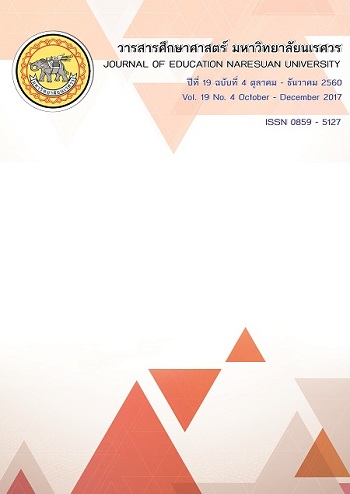CAUSAL MODEL OF PHYSICS ACHIEVEMENT OF MATHAYOMSUKSA 4 STUDENTS IN THE SECONDARY EDUCATIONAL SERVICE AREA OFFICE 18
Main Article Content
Abstract
The purposes of this research were to study the causal model of physics achievement and to validate the model of factors influencing physics achievement of Mathayomsuksa 4 students in the secondary educational service area office 18 to empirical data. The findings of this study were as follows:
1. The study of factors and construct a hypothesis model has 8 latent variables: prior knowledge, home environment, motivative achievement, physics attitude, intelligence quotient, emotional quotient, self-concept and time spent in education increases.
2. The detect and modify the model, canceled physics attitude latent variables from the model.
3. Results for detect and modify the model to be consistent with empirical data was were as follows: the model consisting of 7 latent variables: prior knowledge, home environment, motivative achievement, intelligence quotient, emotional quotient, self-concept and time spent in education increases. The model was fit to the empirical data. All variables in model explain the variance of physics achievement at 72 percentage. The intelligence quotient and time spent in education increases were directly influence physics achievement with statistical significance of .05. The home environment, self-concept, motivative achievement and emotional intelligence were indirectly influence physics achievement with statistical significance of .05. The prior knowledge was influence both directly and indirectly to physics achievement with statistical significance of .05.
Article Details
The owner of the article does not copy or violate any of its copyright. If any copyright infringement occurs or prosecution, in any case, the Editorial Board is not involved in all the rights to the owner of the article to be performed.
References
Institute for the Promotion of Teaching Science and Technology. (2004). A basic science teacher handbook in science learning area. Bangkok: Kurusapa Printing Ladphrao. (in Thai)
Kaensar, S. (2011). The causal factors influencing chemistry learning achievement of Matthayomsueksa 5 students Sri Sa Ket province (Master thesis). Maha Sarakham: Mahasarakham University. (in Thai)
Piumsomboon, P. (2003). Evaluation research: Principle and process. Bangkok: National Institute of Development Administration. (in Thai)
Prajongjit, V. (2011). The Causal Factors Influencing to Students? Learning achievement on science for Mathayomsuksa 6 students under The Jurisdiction of Chaiyaphum Educational Service Area Office 1 (Master thesis). Chaiyaphum: Chaiyaphum Rajabhat University. (in Thai)
Ruengsinchaiwanit, M. (2007). The causal factors influencing mathematics learning achievement of Matthayomsueksa 3 students (Master thesis). Maha Sarakham: Mahasarakham University. (in Thai)
Tangvanichcharoen, N. (2012). The causal factors influencing physics achievement of Matthayomsuksa 5 stuents in Nongbualamphu province (Master thesis). Maha Sarakham: Mahasarakham University. (in Thai)
Wiratchai, N. (1999). LISREL Model: Analytical statistics for classical and behavioral research. Bangkok: Chulalongkorn University Press. (in Thai)


